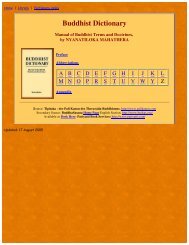Night and Morning with Bhikkhu Tissa
Night and Morning with Bhikkhu Tissa
Night and Morning with Bhikkhu Tissa
- No tags were found...
Create successful ePaper yourself
Turn your PDF publications into a flip-book with our unique Google optimized e-Paper software.
<strong>Bhikkhu</strong> <strong>Tissa</strong>: Would you really be happy, Gene, would you really be glad if I told you that suffering wasmerely an aberration which would vanish by itself <strong>and</strong> never return?Gene: Well, it might be nice to hear, but in fact I wouldn’t believe it. I couldn’t.<strong>Bhikkhu</strong> <strong>Tissa</strong>: The Buddha teaches suffering <strong>and</strong> the ending of suffering. Always keep that in mind. If wewant happiness, if we want freedom from the many forms of pain, we must first learn the true nature of ouraffliction. We must underst<strong>and</strong> that this dukkha doesn’t come out of nothing. The origin of dukkha is craving.Gene: I underst<strong>and</strong> that in principle, in general. Still, isn’t a certain amount of craving necessary? Don’t weneed some moderate pleasures? Since suffering is so pervasive in life, as you’ve been explaining, everybodyprobably feels they need certain things at least as consolation—to cover up or soften their pains. So, forinstance, when I’m feeling low I naturally go looking for enjoyment <strong>and</strong> entertainment.<strong>Bhikkhu</strong> <strong>Tissa</strong>: Do you always? What about this evening?Gene: Oh. Well, this is different, certainly.<strong>Bhikkhu</strong> <strong>Tissa</strong>: Clearly you didn’t come here for entertainment.Gene: No, I guess I didn’t.<strong>Bhikkhu</strong> <strong>Tissa</strong>: And didn’t you turn off your television set quite intentionally?Gene: Yes, I did.<strong>Bhikkhu</strong> <strong>Tissa</strong>: So perhaps entertainment was not a consolation for you this evening?Gene: Well, no, I have to admit it, Venerable <strong>Tissa</strong>.<strong>Bhikkhu</strong> <strong>Tissa</strong>: What we think we must have <strong>and</strong> what we really need are not necessarily the same thing.Usually, being pummelled by strong desires, we believe that pleasures of the senses are a necessity; butsometimes, as perhaps for you this evening, the idea of some possible higher truth, some finer satisfaction orpeace, comes into our minds.Gene: But is all desire bad?<strong>Bhikkhu</strong> <strong>Tissa</strong>: Not necessarily. While we are w<strong>and</strong>ering in saísára we experience desires which, whenacted upon, bring us results both good <strong>and</strong> bad. The desire to practice Dhamma, for instance, is beneficial <strong>and</strong>wholesome. The desire to attain Nibbána—supreme liberation—is a worthy desire. The desire to behavehonorably or to support one’s family or to do some charitable deed is likewise commendable. Desires whichwe act upon intentionally, consciously, start processes rolling which may work out well or badly, dependingon many factors. But foolish desires <strong>and</strong> desires for the pleasures of the senses are always tricky <strong>and</strong> liable tocause trouble. Craving, which is obsessive, ignorant desire, gives rise to suffering because, as we’ve beendiscussing, all the things in the world we might grasp at or lean on are actually mere mist <strong>and</strong> foam. Withinthem no complete satisfaction is to be found.Gene: This craving, <strong>Bhikkhu</strong> <strong>Tissa</strong>, which plays such a large part in Buddhism—could you explain it alittle more specifically?<strong>Bhikkhu</strong> <strong>Tissa</strong>: In explaining the origin of suffering the Buddha speaks of three primary kinds of cravingor taóhá. The first is káma-taóhá—craving for sensual pleasures. This means passion for the pleasing,stimulating experiences of the senses.Gene: That’s not hard to underst<strong>and</strong>. I suppose I’ve spent most of my time pursuing one kind of pleasantsensation or another, <strong>with</strong>out really recognizing the fact. But, now that I think about it, I don’t see what elsebeyond sense pleasures it would be possible to crave for.<strong>Bhikkhu</strong> <strong>Tissa</strong>: There is a second kind of craving. This is bhava-taóhá—craving for existence, for being.Gene: Craving for existence? Do you mean that even the desire to be is a kind of craving?<strong>Bhikkhu</strong> <strong>Tissa</strong>: Yes. This is the craving to go on existing eternally. We living beings want to experiencethings endlessly. Out of a fundamental ignorance about the nature of reality, we thirst, we crave, entranced<strong>with</strong> the flux of saísára. Out of ignorance we want to go on <strong>and</strong> on asserting our supposed “self.”Gene: And we can’t even find any self.9
















